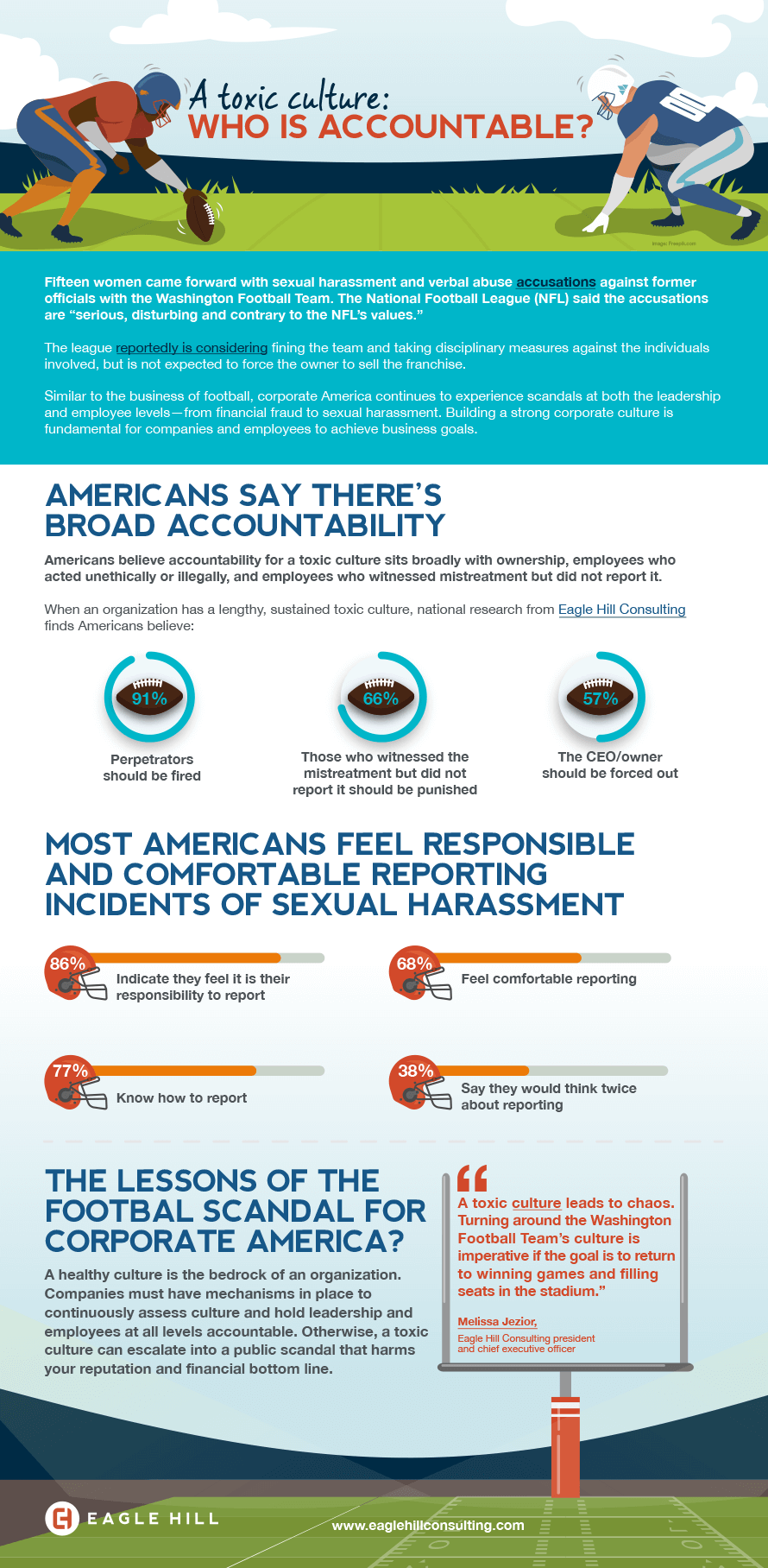Amid new allegations leveled against the Washington Football Team, Americans say leadership, perpetrators and those failing to report misconduct responsible for toxic culture

New Eagle Hill Consulting Research Finds the Vast Majority Feel Responsibility to Report an Incident, Know Reporting Process
Arlington, Va., July 29, 2020 – In the wake of the most recent scandal facing the Washington Football Team, new national research finds that Americans believe accountability for a toxic culture lies broadly – with ownership, employees who acted unethically or illegally, and employees who witnessed mistreatment but did not report it. Moreover, more than three-fourths of respondents agree that victims should be compensated.
In research from Eagle Hill Consulting, respondents indicate that when an organization has a lengthy, sustained issue with toxic culture:
- Perpetrators should be fired (91 percent).
- Those who witnessed the mistreatment but did not report it should be punished (66 percent).
- The CEO/owner should be forced out (57 percent).
- The victims should be compensated (78 percent).
Check out our summary infographic here.
Earlier this month, 15 women came forward with sexual harassment and verbal abuse accusations against former senior officials with the Washington Football Team. The National Football League (NFL) said the accusations are “serious, disturbing and contrary to the NFL’s values.” The league reportedly is consideringfining the team and taking disciplinary measures against the individuals involved, but is not expected to force the owner, Daniel Snyder, to sell the franchise.
“A toxic culture leads to chaos,” says Melissa Jezior, president and chief executive officer of Eagle Hill Consulting. “We’re seeing this play out real-time as the Washington Football Team contends with ongoing culture and performance issues.”
During its 88-year history, the team has won five NFL Championships, 14 divisional titles and five conference championships. But since Snyder took ownership in 1999, the team has had a losing record (142 wins and 193 losses), experienced a sharp decline in ticket sales and attendance, and become known for its troubled culture.
“Culture is the bedrock of an organization. It’s the shared beliefs and values that drive employee behavior and performance, and it’s how work gets done,” Jezior said. “Turning around the Washington Football Team’s culture is imperative if the goal is to return to winning games and filling seats in the stadium.”
The research found that the team’s ongoing culture issues do not surprise Americans. In fact, only 30 percent were surprised by the allegations, and 28 percent of respondents say it is well-known that the team has a toxic culture.
The research also found that the Washington Football Team isn’t alone with culture issues:
41 percent of Americans said the NFL is known to have a toxic culture.
On a positive note, most say they feel both responsible and comfortable reporting an incident of sexual harassment at the workplace – and they know the reporting process:
- 86 percent indicate they feel it is their responsibility to report an incident.
- 77 percent know how to report an incident.
- 68 percent feel comfortable reporting an incident.
- 38 percent say they would think twice about reporting it.
The 2020 Eagle Hill Consulting Washington Football Survey included 1005 respondents from a random sample of Americans. The survey was conducted online by IPSOS in July 2020, polling respondents on the recent corporate culture issues facing the Washington Football Team.
Eagle Hill Consulting LLC is a woman-owned business that provides unconventional management consulting services in the areas of Strategy & Performance, Talent, and Change. The company’s expertise in delivering innovative solutions to unique challenges spans across the private, public, and nonprofit sectors, from financial services to healthcare to media & entertainment. Eagle Hill has offices in the Washington, D.C. metropolitan area, Boston, MA and Seattle, WA. More information is available at www.eaglehillconsulting.com.
Media Contact:
Susan Nealon | 703.229.8600 | snealon@eaglehillconsulting.com | @WeAreEagleHill


